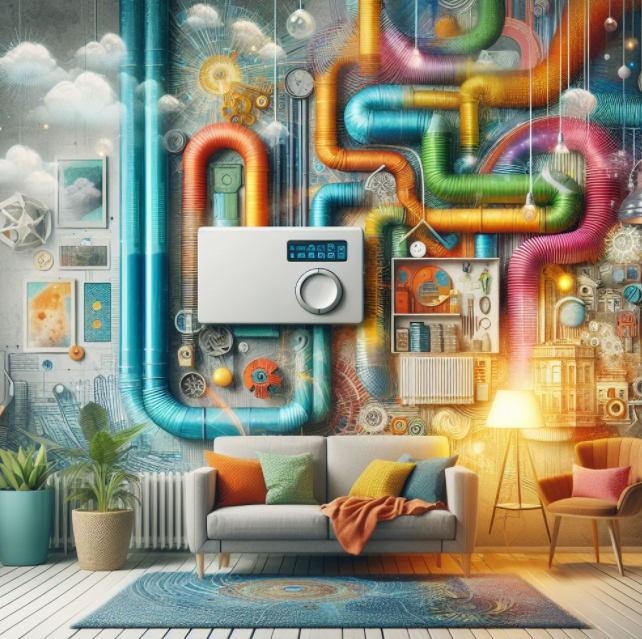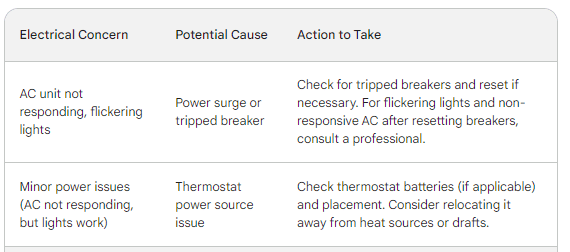
Picture this! It was a scorching summer day with no relief from the heat. Being comfortable, relaxing, or even sleeping in those conditions is hard. This is where your home’s AC system comes in!
- A functioning AC system is essential for keeping your home cool and comfortable during the hot months. It improves your quality of life and can be crucial for your health and well-being, especially for vulnerable individuals.
- Beyond just keeping you cool, a well-maintained AC system can:
- Improve indoor air quality by reducing humidity and filtering out dust particles.
- Help prevent the growth of mold and mildew that thrive in warm, damp environments.
- Extend the lifespan of your furniture and electronics by protecting them from heat damage.
- But how important is it really to understand your AC system? Let’s dive deeper into the reasons your AC is more than just a luxury and explore some simple ways to keep it running smoothly all summer long!
What Is the Difference Between AC and HVAC?
AC (air conditioning) and HVAC (heating, ventilation, and air conditioning) are often used interchangeably, but they refer to different systems with distinct functions in regulating indoor air quality and comfort. Here’s a breakdown of the main differences between AC and HVAC systems:
AC (Air Conditioning)
Functionality: The primary function of an AC system is to cool indoor spaces. It does this by removing heat and humidity from the indoor air. Air conditioning systems are specifically designed to lower the air temperature and improve comfort during warmer seasons.
Components: A typical AC system includes an evaporator coil (which cools the air), a compressor (which circulates refrigerant between the indoor and outdoor units), and a condenser coil (which expels the absorbed heat outside). These components work together to cool the air efficiently.
Types: AC systems come in various forms, such as window units, split systems, and central air systems. Each type serves the same basic function—cooling your home—but they differ in terms of installation, cost, and suitability for different spaces.
HVAC (Heating, Ventilation, and Air Conditioning)
Functionality: HVAC systems are more comprehensive than AC systems because they include heating, ventilation, and air conditioning. An HVAC system is designed to handle all aspects of air regulation, including temperature control, humidity levels, and air quality throughout the year.
Components: HVAC systems typically include everything found in an AC system, plus additional components for heating, such as furnaces or heat pumps, and ventilation components, which may consist of air filters, humidifiers, and dehumidifiers. These systems are designed to work together to maintain comfortable and healthy indoor air conditions.
Types: Like AC systems, HVAC systems can be configured differently, including split systems, hybrid systems (which use a combination of gas and electric power), and ductless systems. The choice of system depends on the specific needs of the building or home, such as size, climate, and energy efficiency requirements.
Key Differences
- Purpose and Scope: The most significant difference lies in their scope; AC is solely focused on cooling, whereas HVAC encompasses heating, cooling, and ventilation.
- Year-Round Use: HVAC systems are suitable for use throughout the year, providing heat in the winter and cooling in the summer, along with continuous ventilation. AC systems are typically only used during warm months.
- Installation and Maintenance: HVAC systems are generally more complex to install and maintain due to their additional components and functions. This can also make HVAC systems more expensive initially and over their lifecycle.
Choosing Between AC and HVAC
Choosing between an AC and an HVAC system depends on your climate and home comfort needs. A standalone AC system might be sufficient if you live in a region with mild winters. However, an HVAC system is more appropriate if you experience cold winters and require a comprehensive solution that addresses temperature, humidity, and air quality year-round.
Initial Steps Before Seeking Professional Help
Before you pick up the phone and call a technician, there are a few things you can do yourself to diagnose or fix minor AC issues. Checking thermostat settings, power supply, and whether all vents are open can sometimes resolve the problem without outside help.
Common AC Problems and Fixes
Condenser Not Turning On:
- Check thermostat settings and ensure it’s set to “cool” and lower than the current room temperature.
- Verify no tripped circuit breakers or blown fuses are preventing the power supply.
- Uneven Cooling:
- Inspect vents for blockages and ensure all are open for even air distribution.
- Constant Running Without Cooling:
- Double-check thermostat settings for incorrect cooling temperatures.
- Consider consulting a professional to discuss if the AC unit you bought is the right size for your home.
- AC Not Cooling:
- Dirty coils can reduce efficiency. Clean them following safety precautions (power off, no harsh chemicals).
- Blocked drain lines prevent proper drainage. Use a wet/dry vacuum to clear clogs.
- Low refrigerant or a faulty compressor requires professional attention.
Uneven Cooling
Is one part of your house cooler than another? It could be a sign that your vents or airways are blocked. Make sure all vents are open and free from obstruction to allow for even air distribution.
Constant Running Without Cooling
The above symptom indicates incorrect thermostat settings or an undersized unit. Double-check your thermostat, and consult a professional to discuss if your AC unit is the appropriate size for your space.
DIY Cleaning Tips for Coils and Drain Lines
Cleaning the coils and drain lines of your AC can improve performance significantly. For coils, shut off the power to the unit and gently clean the coils after removing any debris by hand. For drain lines, use a wet/dry vacuum to suck out any clogging.
When to Call a Professional
If you’ve tried basic troubleshooting and your AC is still not performing well, it might be time to call a professional. Certified technicians best handle issues like low refrigerant, faulty compressors, or complex electrical faults.
Thermostat Troubles
Power Sources for Thermostats
Thermostats can be powered by batteries or your home’s electrical system. Check to ensure that your thermostat uses batteries and they are fresh.
Importance of Correct Positioning
To avoid false readings, keep your thermostat away from direct sunlight, drafts, doorways, and windows.
Resolving Power Issues and Incorrect Readings
If your thermostat is giving incorrect readings or losing power intermittently, check its power source and placement. Moving your thermostat can resolve these issues.
Electrical Concerns

Dealing with Power Surges and Tripped Breakers
Power surges can damage AC units. Use surge protectors where possible and reset any tripped breakers related to your AC system.
Identifying Serious Electrical Problems
Flickering lights or a non-responsive AC can indicate deeper electrical issues. If simple resets don’t work, consult a professional.
Maintenance Tips
Replacing Air Filters
Tip: Replace air filters regularly (every 1-3 months, depending on usage and pet dander) to prevent problems and maintain air quality.
Ensuring Proper Thermostat Function
Periodically check your thermostat’s functionality by noting if it turns on and off at the desired settings.
Preventing Ice Buildup on the AC Unit
Ensure good airflow around your unit and maintain it regularly to prevent ice from forming.
Ensuring Efficient Airflow
Checking and Cleaning Vents
Regularly inspect and clean your AC vents to ensure nothing is blocking the cool airflow.
Managing Compressor Placement and Clearance
Ensure your compressor has at least two feet of clearance around it to ensure adequate airflow.
Cleaning Air Ducts for Unrestricted Airflow
Having your air ducts professionally cleaned every few years will ensure that your AC system runs efficiently.
Cleaning and Maintenance
Accessing and Cleaning Evaporator Coils
Heat is absorbed from your home’s air by evaporator coils. Keeping them clean helps your AC run efficiently.
Cleaning Compressor Coils
Compressor coils release the absorbed heat outside the home. Keeping these clean ensures that your AC can continue to cool your home effectively.
Handling Refrigerant Issues
Certified professionals should address refrigerant issues since mishandling can be dangerous and is also regulated by law.
When to Call a Professional
While DIY maintenance is great for simple issues, there are times when you need to call in the experts. This is particularly true for any refrigerant issues, complex electrical problems, or when your unit is not cooling after you’ve done basic troubleshooting.
With the right tools and the required expertise, professionals can diagnose issues quickly and efficiently, potentially saving you from more significant expenses down the line.
Wrap-Up and Final Thoughts
As we wrap up our discussion on maintaining and troubleshooting your home’s cooling solutions, it’s essential to emphasize the diverse range of air conditioning systems available, from traditional central air systems to innovative ductless mini splits.
Each air conditioning system, whether a classic split system, a comprehensive central air conditioner, or a modern ductless mini, is designed to meet specific household needs, considering factors like space, efficiency, and AC system cost.
Regular maintenance ensures efficient operation and longevity for homes utilizing heat pump systems, including those with a heat pump condenser or split systems. Similarly, managing a ductless mini split system or a mini split setup involves understanding the nuances of both the indoor unit and the outdoor unit, which work together to provide efficient cooling without extensive ductwork.
The heart of any air conditioning unit or heat pump system—be it the evaporator coil in the air handler or the condenser in a multi-split—requires routine checks to maintain peak performance. This ensures that whether you’re dealing with a heat pump or a straightforward air conditioner, the system can effectively manage the heat transfer from indoor to outdoor, keeping your living space comfortable.
Moreover, the SEER2 rating, a measure of efficiency for air conditioning systems, highlights the importance of choosing the right system for both environmental impact and operational cost. Brands like Goodman are known for their durable and efficient models, which include a variety of options from air conditioners to heat pumps, all designed to enhance indoor air quality and comfort.
When considering upgrades or installations, think about the specific needs of your home air system. Whether it’s a central air conditioning setup or multi-split systems, the right configuration can make a significant difference in both comfort and utility costs. The HVAC system, including the air conditioning, heat pump, or any air conditioning system, not only impacts the indoor climate but also contributes to the overall energy footprint of your home.
In addition to these considerations, understanding the AC system types and their respective configurations is vital. An AC system diagram can help visualize how components like the car AC system differ from an AC system for home use, each designed to meet specific environmental and operational demands.
In conclusion, whether you’re upgrading to a high-efficiency system, troubleshooting an existing unit, or considering a new installation, remember that your home’s air conditioning is a key component of your daily comfort and quality of life. Ensure that your system includes the right features—from heat pump systems to split systems—to provide efficient, reliable service. Always keep maintenance a priority and don’t hesitate to consult with professionals to optimize your home’s air conditioning for peak performance.






















